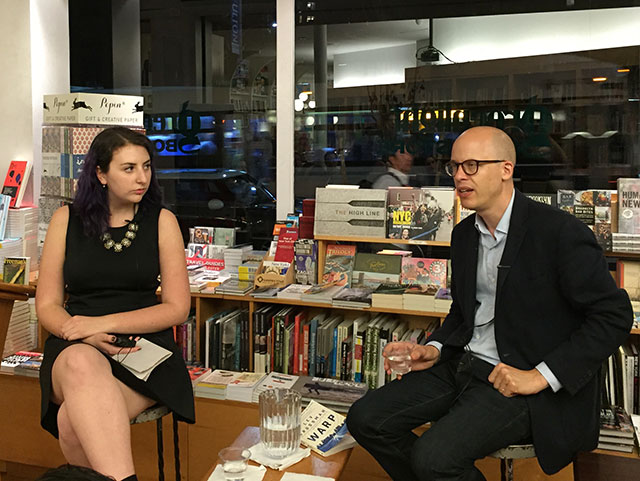
Lev Grossman spent the last decade crafting a universe filled with multiple worlds and the magic of wizards. But before he wrote The Magicians, he published a short novel titled Warp, about a depressed man obsessed with a love of science fiction and video games. With the success of The Magicians series, St. Martin’s Press re-released the debut novel with a new introduction. He was at Greenlight Bookstore to discuss the book with Dana Schwartz, a New York Observer Arts and Entertainment writer. Her debut novel And We’re Off is due out in the spring, followed by a memoir next fall.
Warp was first published in 1997. Protagonist Hollis is a depressed twenty-something. His life isn’t all that interesting, but to pass the time, he has created a whole other world involving starships exists in his head. The first edition cover art went as far as including an image of the Starship Enterprise from Star Trek: The Next Generation. Perhaps, unsurprisingly, using the ship as clipart landed the publisher in some legal trouble.
Grossman explains he wrote the depressed character of Hollis during a period of his life when he himself was depressed. He had set out to drive across country. By the time he got through Pennsylvania he grew bored of the expedition and instead headed to Niagara Falls. For unexplained reasons he turned toward Maine where his car promptly broke down. He decided to rent a place to live and begin to write.
Warp emerged after a long period of working on it and during a specific cultural moment. Grossman admits he had even started out writing a spec script for Star Trek, one of the few shows on television that would accept scripts without agency representation.
The new edition of Warp includes a introduction from Grossman, and Schwartz describes this as one of her favorite essays. It explains some of the changes in his approach to writing. The prose of this introduction is noticeably more Grossman-esque.
As he has said before, Grossman grew up in a household full of books. He felt for a long time that to be respected, he had to write literary fiction and this meant writing realistically. Genre like fantasy and science fiction weren’t really acceptable.
The idea of realism in fiction is relatively new, of course, he points out, explaining that it only became important to writing in the nineteenth century. He says he had a general sense that to be at the center of literary writing and to be taken seriously, he needed to write realism. Grossman says that in Warp is his attempt to try and figure out how to make a realistic narrative without the boringness of real life.
There are of course similarities between Hollis of Warp and Quentin of The Magicians. However, Grossman says by the time he was writing Quentin, he was much more aware of depression. He hadn’t experienced therapy during the writing of Warp, and he spent plenty of time writing that novel struggling with depression. It shows in Hollis, he says.
Much of Warp is based around the idea of exciting things happening, just not where Hollis is, and he having the sense that he was missing out. Grossman says he has spent a lot of his life feeling like “shit was happening elsewhere.”
He spent time working on Warp while in graduate school. His first wife read the manuscript, though he promises making her read it wasn’t why they eventually split. “I hero worshipped my friends a lot,” he says, and he thinks it shows in his books.
The six months in Maine he spent working on the book is a time he claims he doesn’t remember doing very much. “I drank a lot of Baileys,” he jokes.
Grossman says he was obsessed with science fiction and fantasy, but that he never considered writing that to be a possibility. “It never occurred to me that I could write in that mode.”
A member of the audience asks him for advice on writing. “Writing advice has a tendency to sound glib,” he says.
When writing Warp, he explains, he had the idea of writing what he knew. That isn’t the trick, however. The trick is not in writing what you know, but figuring out what it is that you do know. For Grossman, he thought he knew what it was to be an unemployed, depressed twenty-three-year-old. Really though his knowledge was video games and cheap booze.
He worked hard to turn Warp into a highly polished, highly edited, tightly controlled piece of prose. He labored to make the prose a certain way. He was interested in the novel as an art object. “I’m glad I don’t write that way now,” he says.
“I admire my past self for trying so hard.”